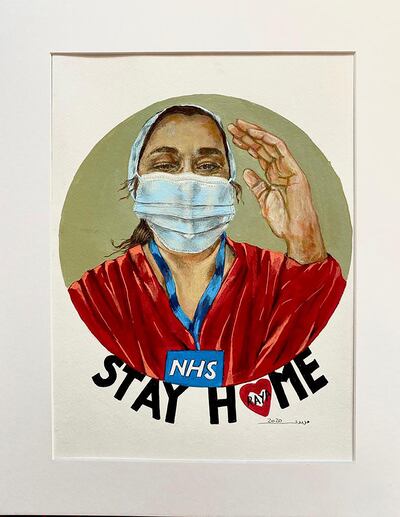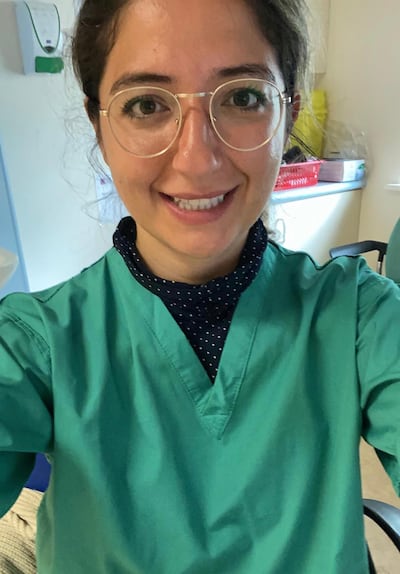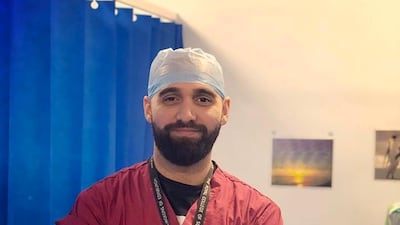The accounts of British Iraqi doctors reflect the turmoil and trauma in the National Health Service as it struggled to cope with the rampant spread of Covid-19 in the UK despite shortcomings.
“I think that you cannot be prepared for this. Even if you go back, you can never be prepared for it,” said Raya Al Mashta, an anaesthetist at Ealing Hospital in north-west London.
Soon after the outbreak began, the hospital posted Dr Al Mashta to its intensive care unit, which she described as being “on the front line of the front lines”.
"If you ask me how I feel I would need a dictionary to tell you," she told The National, adding "it's been disastrous".
Dr Al Mashta said this was the first time she had been able to speak about the crisis after the emotional pressures and stress, something many health workers have experienced.
“The age group of 35-60 was the most difficult to deal with because they look you in the eyes and ask you, ‘do you think I’m going to die? Will I wake up?’. It was difficult,” she said.

More than 33,000 Covid-19 patients have died in the UK so far, with number of reported cases passing 233,000 on Friday.
Afraa Al Sabbagh, a paediatrician at North-West Anglia NHS Foundation Trust, said doctors and nurses were experiencing increasing levels of distress.
“Doctors are anxious at different levels, senior and junior, because we don’t know much about the virus,” said Dr Al Sabbagh, who caught the virus but recovered.
She compared the situation to her early years of practice in Iraq, when international sanctions on Saddam Hussein’s regime crippled the healthcare system.
"This led to a testing time which was very restricted, worrying and pressured, with a healthcare system that had strains on its workforce and resources," said Dr Al Sabbagh, who moved to the UK in 1997.
While some doctors who spoke to The National lamented British government's slow response to the pandemic and the state of the country's severely underfunded health system, Dr Al Sabbagh appreciated its efforts.
"We have scientists working on producing research and treatments and a competent workforce to be grateful for," she said.
But other health workers say they have struggled to deal with the pandemic and surge of patients without adequate support from the government.
Delayed response
“We knew about the virus back in December, we saw what was happening in Italy and elsewhere with the lockdowns, yet the government decided to continue as normal and delay a lockdown,” said Ahmed Twaij, an NHS doctor treating patients in intensive care.
Dr Twaij said the NHS had experienced 10 years of austerity and cuts that allowed it to collapse.
“We haven’t been able to afford the best practices for patients for a long time and coronavirus just brought that into the limelight.”
Wisam Ali, a consultant in neuroanaesthesia at King's College Hospital in London, agreed that government could have locked people down earlier.
“I don’t think they appreciated Covid-19's full intensity until it was a bit late and that’s why you see so many cases – not just in the UK but around the world too,” he said.
Dr Ali is concerned about the shortage of protective equipment such as face masks, visors and gowns despite government promises to solve the problem.
"They give you one mask from the morning until the evening,” he said. The kits are meant to be "disposable but we can't dispose of them because there isn't much replacement.”
Testing failure
A lack of testing facilities contributed to the rapid spread of the virus, according to an Iraqi NHS doctor who contracted the infection himself.
“Even if the patients were in hospital, you would have to call 111 and explain the symptoms of what they were going through,” said the doctor, who asked not to be named.
The process would take hours, he said. “During that time, you do not know if the patient has the virus or not – they could be sat in an open bay. And this was before the whole thing kicked off.”

Seiver Karim, surgical trainee at a hospital in East England also contracted the virus, said that not knowing initially whether he had it or not was one of the hardest things he experienced.
“I would have liked a test at the time but there was information going around that even if you had one done it could have been a false negative – meaning that you still could have it,” Dr Karim said.
The NHS was fully aware of the risks doctors were taking, he said.
“There is a risk that when you leave your house you could also get it, but there is an increased risk when we are at the hospital,” said Dr Karim.
Health Secretary Matt Hancock promised to increase the number of tests to 100,000 a day by the end of April. The government managed to log 122,347 tests on 30 April, but the target was missed for eight consecutive days before being reached again on May 10.
Difficult choices
Faced with a flood of coronavirus cases, hospitals postponed treatments for thousands of other patients. Many were discharged from hospital and private health operators were enlisted to help the NHS cope with the crisis.
Doctors now face extra pressure in dealing with such patients, said Maryam Hassan, a clinical general practitioner.
“If I want to assess someone who has a non-Covid issue, I would now have to think about the resources we have and what is safe to delay and what needs investigation now,” she said.
Dr Hassan cited the example of a patient showing signs of cancer, where not sending not sending them to a hospital could delay a proper diagnosis, but sending them for tests could put them at risk contracting the virus from the hospital.


